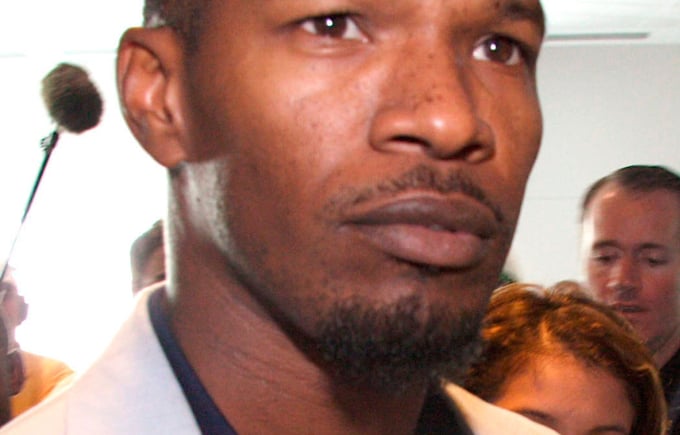What You Should Know About Brain Bleeds and Risks of Jamie Foxx’s Health Scare
Actor and Grammy-winning musician Jamie Foxx opened up about a terrifying medical emergency that nearly took his life. In his Netflix comedy special, Jamie Foxx: What Had Happened Was, Foxx revealed he had a brain bleed in April 2023 that caused a stroke and placed him into a coma for several weeks.
Steve McNair
12/11/20245 min read


Actor and Grammy-winning musician Jamie Foxx opened up about a terrifying medical emergency that nearly took his life. In his Netflix comedy special, Jamie Foxx: What Had Happened Was, Foxx revealed he had a brain bleed in April 2023 that caused a stroke and placed him into a coma for several weeks.
“I was battling for my life,” Foxx said. “I had a horrible headache on April 11. I requested an aspirin from a friend, but before I could take it, I lost consciousness. I can’t recall the next 20 days.”
A Life-Threatening Condition
Foxx was taken to Piedmont Hospital, where doctors quickly worked to save his life after he collapsed. A neurosurgeon decided that immediate surgery was needed to resolve the brain bleed that had led to his stroke. The surgery team was quoted as saying, “If I don’t go into his head right now, we’re going to lose him.”
For weeks, Foxx was in a coma, waking up on May 4 to a new, cruel reality. “Then I woke up, and I was in a wheelchair. I couldn’t walk," he said. The actor attributes his recovery, in part, to the relentless love of his family, the power of his faith, and plain stubbornness. He refers to his return to health as a “miracle.”
Foxx opened up about his ordeal three months later. During his recovery, he wrote in a video shared on Instagram, he had gone “to hell and back.” His story shows just how serious brain bleeds can be, a medical emergency that can happen to anyone.
### What is a Brain Bleed?
A brain bleed, or hemorrhagic stroke, is when a blood vessel in the brain bursts, sparking bleeding in or around the brain. Not only does bleeding put pressure on brain tissues, it destroys them and disrupts normal brain function. Brain bleeds make up 10 percent to 15 percent of all strokes and are often more serious than other kinds of strokes, medical experts say.
The dangers of this condition have been recognized by experts like Dr. Paul Saphier, a New Jersey neurosurgeon. “Acute brain bleeds can occur, and high rates of mortality are often observed,” he said. “This is a medical emergency — a critical illness — and appropriate medical treatment is needed to survive and get well.”
There are many reasons this can happen with all kinds of diseases and conditions.
Bleeds in the brain:
The gist of it.
High Blood Pressure (Hypertension):
Chronic high blood pressure is one common reason. It sags lewdly limp through arteries and veins, derivatively and passively tints the walls of them—numb toward their rupture by force.
Trauma or Head Injury:
A blow to the head—from a car crash, a tumble, or some other event—can lead to bleeding within the brain.
Aneurysms:
Aneurysms are distended weak spots in blood vessels that can rupture suddenly, leading to fatal bleeding.
Blood Clotting Disorders:
Certain conditions can increase the risk of bleeding that won’t stop, including hemophilia, or the use of blood-thinning medications.
AVM (Arteriovenous Malformations):
AVMs are abnormal knots of blood vessels in the brain. They have a tendency to rupture and bleed in the brain.
Substance Abuse:
Drugs such as cocaine or methamphetamines can spike blood pressure, increasing the chance of a rupture.
Age and Genetics:
People older than 65 and those with family histories of stroke or aneurysm are at increased risk.
Symptoms to Watch For
The reason it’s important to be aware of the symptoms of a brain bleed is access to competent medical care in a timely manner. Common signs include:
Sudden, intense headache (often described as the “worst headache of your life”)
Nausea and vomiting
Weakness or numbness of the face, arm, or leg, particularly affecting one side of the body
Difficulty speaking or understanding speech
Difficulty walking or loss of balance or coordination
Blurred or double vision
Loss of consciousness
If you are having these symptoms, or if someone near you is, make an emergency medical call immediately. When it comes to brain bleeds, time is of the essence.
Treatment of Brain Bleeds
Whether a brain bleed requires treatment, and what that treatment will be, depends on the amount of blood, its location in the brain, and whether it’s causing problems. Common interventions include:
Emergency Surgery:
For someone like Jamie Foxx, they typically go in and perform surgery to relieve pressure on the brain and stop the bleeding. Surgeons can also remove part of the skull (a procedure known as a craniectomy) to allow the brain to expand without additional injury.
Medications:
Physicians might provide medications that reduce blood pressure, prevent seizures, or decrease the swelling in the brain.
Rehabilitation:
Most patients require physical therapy, occupational therapy, and speech therapy to restore lost abilities after their initial treatment.
Recovery After a Brain Bleed
Recovery from a brain bleed can be a long and hard road. Patients have to overcome barriers—physical, emotional, and cognitive—to:
- Limited Mobility: Patients may need to relearn putting one foot in front of the other, or other activities of daily living.
- Speech and Communication Issues: Strokes and brain traumas can fully impair the ability to speak or utilize the language.
- Emotional Changes: Depression, anxiety, and mood swings are typically expected in the recovery period.
- Memory and Cognitive Difficulties: Some patients have trouble concentrating or with memory.
Foxx’s story of awakening in a coma and finding his way back, one slow claw at a time, is a tale of the will to recover. His experience is also a testament to the power of home support and the possibility of rehabilitation.
YES! In that case, it was discovered that there are some simple things you can refuse to decrease your risk of brain bleeds. Not all brain bleeds are preventable, but here are a few things you can refrain from doing to attempt to shield yourself:
Other risk-aid is high blood injury: high blood pressure levels are a substantial risk factor. Regular physical activity can assist you in avoiding it. Also, a heart-healthy diet and medications and prescription maintenance plans.
To stop drinking alcohol and smoking: Both kill and poison, raising the risk of a stroke and an aneurysm.
Protective equipment: Helmets and seat belts can shield you from head injuries resulting in a brain bleed.
Lead medical circumstance: If you have diabetes, elevated blood levels of cholesterol, or a clot blood disorder, partner with your doctor to control these conditions.
Family history: If you have a family history of strokes or an aneurysm, you should talk to a physician about the dangers to your health.
Regular exercise and eating well: Active and regular physical exercise and consuming lots of fruits, vegetables, and whole grains can assist you in handling your heart and circulatory health levels.
Jamie Foxx’s narrative: Jamie Foxx was about to expire. Not many people are conscious of how immediate and destructive a brain bleed is; his affection for personal counterfeiting sources attention to something most people know reasonably scarce about.
A lot of shit is stacked against Foxx, but the man has made a monumental comeback and serves as a reminder of the strength of the human will and faith in the Lord. His experience is a beacon of hope to others undergoing analogous health emergencies.
Raising Awareness
Brain bleeds can potentially kill, but they are treatable if caught early. Stories like Jamie Foxx’s underscore the need to recognize warning signs and get medical attention quickly. They also prompt us to do our part to protect our brain health with lifestyle changes and regular visits to the doctor.
For those encouraged by Foxx’s journey, his recovery is a testament to the fact that with immediate interventions, support, and willpower, you can rise above even the most extraordinary challenges.
Written by Steve McNair




Updates
Stay informed with the latest trending news.
Insights
News
contact@flashtopnews.com
+1234567890
© 2024. All rights reserved.
Disclaimer: We are affiliates. It means that we may receive a commission if you ever purchase a product on our site, with no-extra cost for you of course... Thank You Very Much!
